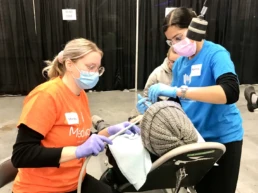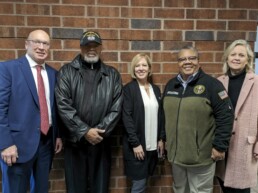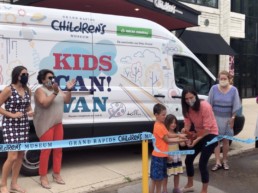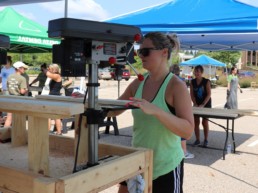Brush program wipes out fear
Going to the dentist can trigger anxiety for children under the best of circumstances. For Erica Walker and her daughter Mallory, who has cerebral palsy, it was downright scary.
“She was terrified to go to the dentist, to sit in the chair, to lay back, to open her mouth and let them work on her teeth,” says Erica of Fort Wayne, Indiana. “Everything about the situation made her nervous and scared.”
Mallory, 7, was born with a seizure disorder that led to a hemispherectomy to remove half of her brain at 6 months old. The surgery stopped the seizures but left her with cerebral palsy, which means she has weakness from head to toe on her right side and has trouble doing things most people take for granted—chewing, swallowing, walking, using her right hand.
She now does wonderful at the dentist. She gets in the chair by herself. She asks lots of questions. She lets them clean and count her teeth—all without any distress.
—Erica Walker
On top of the daily challenges, Mallory has had numerous dental problems related to a fall and subsequent infection that caused her to have three teeth extracted when she was just 3.
Erica needed help diffusing Mallory’s anxiety and reinforcing good oral health habits with her and her other children, Carter, 9, and Gracelyn, 4.
That help came when she discovered the new Brush materials, specifically developed for children with special needs.
Brush is an interdisciplinary yearlong oral health curriculum with support materials, including hands-on teaching resources, designed to introduce oral health education while reinforcing literacy, science, math and creative arts.
Pictured right: Erica Walker and her children, left to right, Gracelyn, Mallory and Carter. Photo courtesy of Allison Turcovsky of AMT Photography, Fort Wayne, Indiana.
A comprehensive approach
The goal of the Brush program is to reduce dental decay in infants and young children using a comprehensive approach that involves parents, caseworkers, early childhood education professionals and children.
“We developed Brush to be used in early childhood education settings and by home visitors. Almost from the start we were getting requests to develop specific materials for children with special needs,” says Holli Seabury, Ed.D., former CEO of McMillen Health and new executive director of the Delta Dental Foundation (DDF). “When interviewing parents, we heard so many heartbreaking stories about how many dental issues their children had and how scared parents were to take their child to a dentist, even though it is critically important for children with a disability to have a dentist on their health care team.”
With support from the DDF, the Brush program developed specific training and materials for use by early interventionists and educational materials for parents of children with special needs. In the pilot year, 250 professionals who work with more than 5,000 children received training.
When interviewing parents, we heard so many heartbreaking stories about how many dental issues their children had and how scared parents were to take their child to a dentist, even though it is critically important for children with a disability to have a dentist on their health care team.
—Holli Seabury, Ed.D., former CEO of McMillen Health and new executive director of the Delta Dental Foundation
“It allowed for another way to teach brushing,” says Erica, a pediatric social worker. “Having something to hold onto and play with made it less scary for them. And, for me, the program was easy to read and learn about.”
The new parent tools in the Brush program helped Erica make teaching and learning about oral health a family affair. Coupled with finding a sensitive pediatric dentist, this has made all the difference for Mallory.
“She now does wonderful at the dentist,” Erica says. “She gets in the chair by herself. She asks lots of questions. She lets them clean and count her teeth—all without any distress.”
Helping thousands
In 2018, the Delta Dental Foundation, McMillen Health provided the Brush curriculum, professional development training and parent materials to nearly 35,000 children in Michigan, Ohio and Indiana. Nationwide, the Brush program has helped 1.5 million children, from infants through age 6, since its inception.
Others like Mallory
For many children with a disability, their smile is their most effective way of interacting with the world. Poor oral health may affect a child’s quality of life and their ability to eat, sleep and function without pain. The Brush program’s new educational resources and training improve the oral health of our most vulnerable children and help all children to reach their full potential.
To learn more about the Brush program, go to









